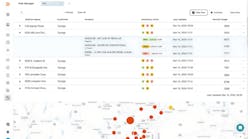Although the Houston Gulf Coast area is suffering from the effects of Hurricane Ike, the American Petroleum Institute (API) is reporting that the problems for the oil industry appear to be less than those associated with Hurricanes Katrina and Rita in 2005.
Hurricane Ike centered on the Galveston/Houston area, coming ashore September 12, bringing high winds and record-setting ocean surges that battered the area.
The latest Department of Energy (DOE) reports show that the Environmental Protection Agency (EPA) has issued a waiver for Texas permitting the use of federally-compliant ultra low sulfur diesel in lieu of Texas low-emission diesel through September 30, 2008.
Oil companies are installing generators at gas stations in the Houston and Beaumont area, especially along re-entry routes, where power is not reliable. Shell is deploying 19 generators as of September 15, and securing another 10 generators for potential deployment later this week. ExxonMobil and Chevron both are installing portable generators and making product deliveries at priority or strategic sites. Chevron also dispatched 20 tanker trucks from other areas of the country to Houston to expedite fuel distribution in the impacted area. ConocoPhillips reports that the Pasadena TX refined products distribution terminal reopened on the morning of September 15. The Clifton Ridge Marine Terminal near Lake Charles LA also is open, all according to DOE information.
DOE also said that virtually all crude production, and 92 percent of natural gas production, in the Gulf is still shut in; 14 refineries are shut down in Texas and Louisiana; and, while Colonial Pipeline restarted its line at reduced rates, major crude pipelines originating in Texas and Louisiana remain shut down.
Meanwhile, Louisiana’s Department of Natural Resources reports that 33,975 barrels per day or 22 percent of the normal Louisiana oil production has been restored.
The Coast Guard said that the Port of Houston-Galveston has re-opened portions of the Gulf Intercoastal Waterway and Houston Channel to commercial vessel traffic, with some restrictions.
"We are building on the lessons learned from our experiences with Hurricanes Katrina and Rita three years ago, and our industry has the know-how to deal effectively with the effects of disasters such as Ike," Red Cavaney, president of API, said in a statement released September 15. "Clearly, we have experienced damage to a number of our facilities. Consumers across the country can help in a big way in efforts to recover from this disaster by using available fuel and energy supplies wisely and efficiently."
Cavaney noted that much of the nation relies on fuel refined in the Gulf of Mexico region that is typically shipped by pipeline to retailers, sometimes at distances well in excess of 1,000 miles.
Related articles:
View complete coverage of Hurricane Ike from Bulk Transporter and other Penton Media publications.









